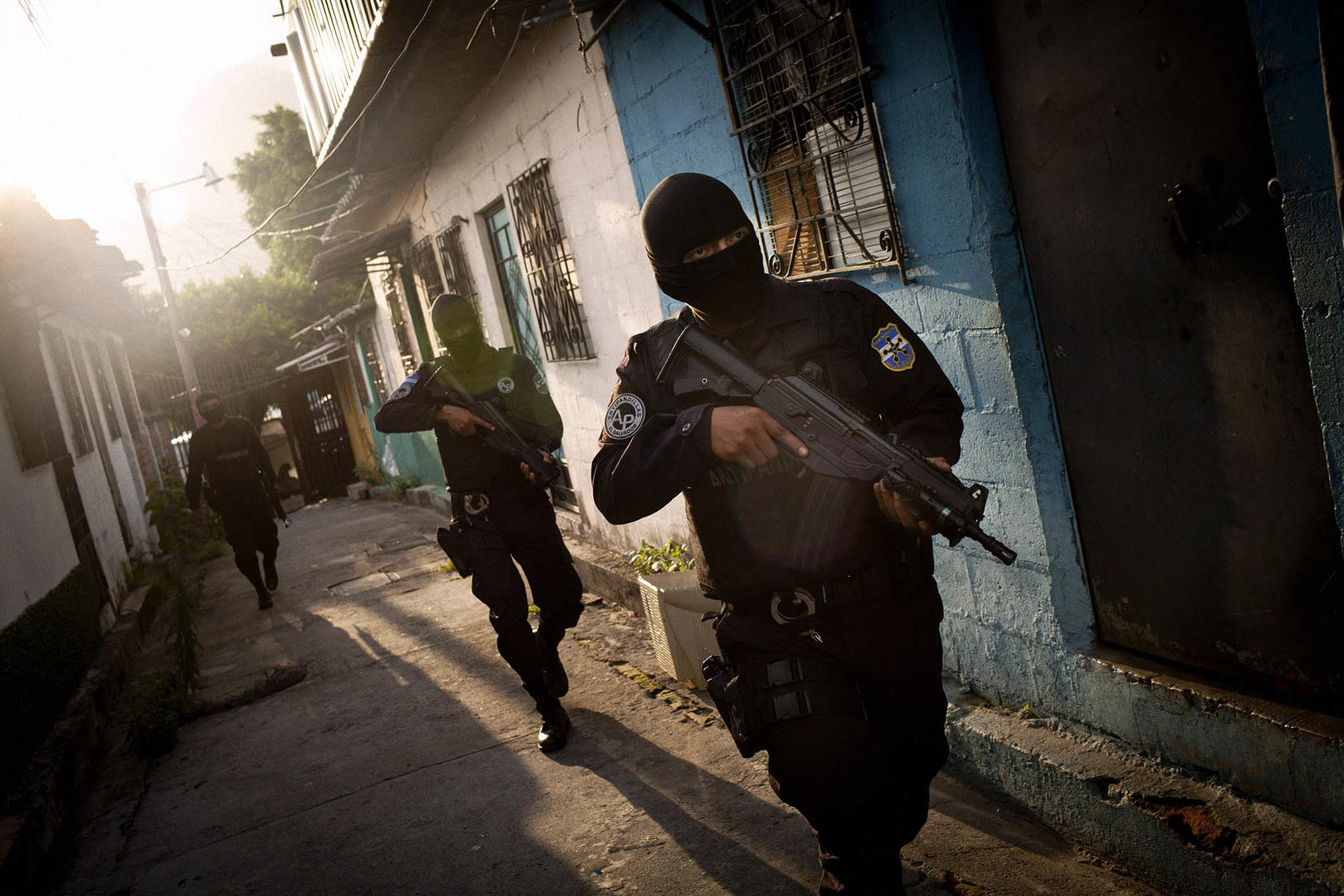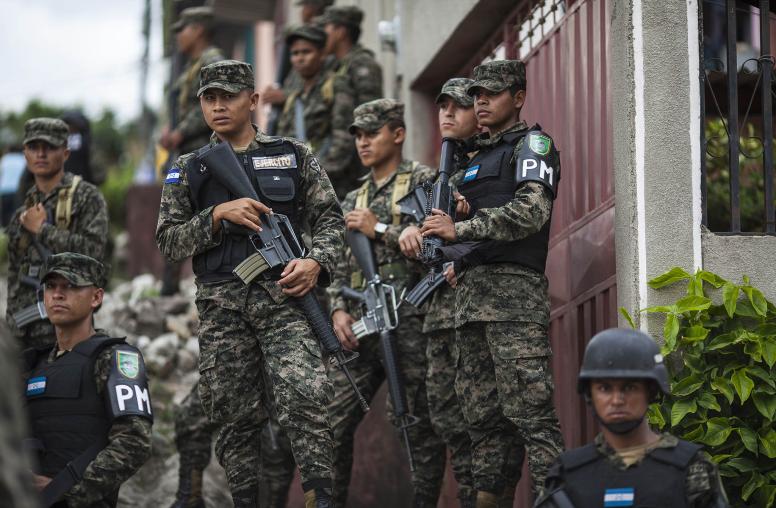Ending El Salvador’s Cycle of Gang Violence
The government has tried both repression and accommodation. Is there an opportunity for a new approach?
El Salvador has long suffered from cycles of extreme violence linked to powerful criminal gangs. National authorities have responded with both severe repression and secret appeasement. In public, governments may enact “mano dura” or “iron-fist” policies, which include mass arrests of suspected gang members. But in secret, Salvadoran leaders have negotiated with imprisoned gang leaders, providing them with benefits in return for ordering their members to dial back the bloodshed.

Under President Nayib Bukele, the Salvadoran government has initiated an unprecedented anti-gang crackdown in response to a weekend surge of killings in March that many suspect signaled the breakdown of a secret gang truce. Since declaring a state of exception in March 2022 that suspends certain constitutional rights, the government has arrested more than 53,000 suspected gang members, doubling the number of people held in the country’s prisons. Almost two out of every 100 Salvadorans is now in jail, the highest reported incarceration rate in the world.
Despite (or perhaps because of) his iron-fisted policies, the Salvadoran president remains popular, with approval ratings that have hovered between 80 and 90 percent. But what comes next? How does the president use his popularity to develop a long-term strategy and institutions that can contain gang violence without violating human rights and without further harm to communities whose social and familial fabric has been hit hard by the crackdown?
USIP’s Mary Speck spoke with José Miguel Cruz, a Central American gang expert at Florida International University, about the power of Salvadoran gangs, the impact of mass incarceration and whether negotiations with gang leaders might offer a pathway to lasting peace.
Speck: We generally think of gang members as youths from underprivileged backgrounds who are searching for social connections, excitement and, often, financial gain through crimes such as retail drug sales. Do Central American gangs fit this pattern? What make them so powerful?
Cruz: In both the United States and Central America, basically we're talking about young people who are searching for belonging and trying to respond to the questions about identity that you always have when you're young. Because of the conditions where they live — poverty, exclusion, marginality — the gang becomes their immediate group of reference. That’s basically what we see in both the United States and in Central America.
What sets Central American gangs apart is their capacity to control daily life in their neighborhoods, using a lot of violence. Another important difference is that the main source of income for gangs in the United States is drug trafficking at the local level. In Central America, they rely much more on extortion, imposing taxes on the local people. They become a kind of ruler, developing this capacity to tax the population.
If you try to develop a small business or start a company in a neighborhood controlled by gangs, you have to pay “renta,” or rent, in order to “get security.” This is normally what the state does: ask you for taxes in return for giving you some kind of security. That’s the kind of power gangs have developed in Central America especially in poor barrios or the deprived zones.
But even within Central America there are important differences. Gangs have developed the most in El Salvador, then Honduras, then Guatemala. Why is this? Well, there are many different factors, but I think one of the important factors is that in Honduras and Guatemala, you have other criminal actors — specifically drug trafficking organizations — that have prevented gangs from growing as powerful as in El Salvador.
Speck: El Salvador, Guatemala and Honduras have all implemented so-called mano dura policies to combat gangs. The Salvadoran crackdown since March 2022 is the most recent and extreme example. Nonetheless gangs still dominate impoverished urban neighborhoods throughout the region. Do these crackdowns weaken — or at least contain — the gangs? And if not, why not?
Cruz: We know a lot about the impact of “mano dura” policies now, because they have been implemented since the early 2000s. Basically what we found is that these policies, especially in El Salvador, motivated the gangs to become much better organized.
First, because these crackdowns generated a lot of grievances among the population. That pushed many kids into the hands of the gangs. Second, the government put those they arrested together in these massive prisons. So, you have people from different parts of the country together in a prison. And they start networking and establishing connections. The crackdowns provided these opportunities, 24/7, for kids and young men to organize.
El Salvador cracked down on gangs in 2003 and by 2004 we started seeing evidence that extortion was becoming a problem. Why? Because gang members in prison started demanding that their pals outside prison send them money. So, the gang members outside started extorting the population to send money to those inside. And the people in prison also started using cell phones to extort people outside prison.
It is clear that after mano dura, extorsions went up. Homicides also went up because there were wars between gangs to gain territorial control and also between the state and gangs.
Speck: The U.S. government and other donors have worked with the Salvadoran government on gang and violence prevention programs. And there is evidence that these programs can be effective. Why haven’t they been scaled up? And why have Salvadoran governments chosen instead to negotiate with gang leaders?
Cruz: Salvadorans did realize that mano dura policies weren’t working. So [President Mauricio] Funes started trying more preventive policies after taking office in 2009. But — and this is very important in terms of policy — preventive measures take time. You have this kind of momentum or inertia from the crackdowns, so gangs continue to strengthen while at the same time you’re trying to implement preventive policies. People were not seeing results and the homicide rate remained high.
So Funes does a 180 and puts the Minister of Defense [David Munguía Payés] in charge of security. And the first thing the minister does is to go back a bit to mano dura. But at this point, gangs are better prepared and start responding in the same fashion. So, what you have is even more violence.
It seemed like nothing was working. Prevention seemed not to be working. The hard approaches didn’t work. So, the minister says, “What we need to reduce are homicides.” And the only way to do so is by talking with gangs, and that's how he came up with the truce. He negotiated the truce to reduce homicides. He didn’t care about extorsions or other things, just homicides. And it worked!
The limitation of the truce was that while people liked the reduction of homicides, the truce didn’t really address the gang control in the communities. And the gangs continued extorting. That's when you have the backlash. Because people are saying “Ah, now they are negotiating with gangs. But I still have to pay rent to the gang. The gangs are still here, right? The gangs haven't disappeared.”
Speck: What can be done? Violence prevention efforts are unpopular because they take too long. Gang truces may offer relief from violence but allow gangs to retain local control. Mass incarceration can create a new generation of gang members. Is there any way to break out of these cycles of accommodation, repression and resurgence?
Cruz: Considering the power gangs have at the local level, I think any solution has to entail some kind of negotiation. Recognizing that the gangs are what we call in Spanish “un poder fáctico,” a factual power at the local level.
The problem with the truce of 2012 or Bukele’s negotiations with the gang leaders is that they don’t address what I think should be the ultimate goal: the demobilization of the gangs as criminal actors and their incorporation into licit ways of living. They also did it clandestinely, so you don’t know what arrangements were made.
You should negotiate with gangs as part of a strategy to demobilize them, and also to provide justice to the victims, which should also be part of the equation.
There are people who need to be held accountable: the leaders. But you also need to remember, many of these guys did terrible things when they were kids and some are still kids, so you have to take that into consideration even as you try to provide justice to victims.
Many of the gang leaders are very much aware of all the things they did, and some of them have remorse. Some of them acknowledge that they need to pay for that. Many of them want their kids to have a normal life.
So, what can we say is “you have to pay for what you did. You have to be in prison. But your family and your community will be safe. They will have the opportunities they deserve as any other member of the society.”
Many gang members have even told me, “Look, I’m still in this because of my family, because otherwise I won't have anything to offer to my family. They will starve.” Many never completed school; they’ve never received any training. And their kids also never got any education, any training. So, a bargaining chip may be to offer a future for these families, these communities, while at the same time holding the leaders accountable, keeping them in prison, basically paying their debt.
We have tried mano dura. We have tried gang truces. And we keep failing. So, why not negotiate gang demobilization? You have to invest a lot of money and political capital. President Bukele might have been in a stronger position to do so early in his tenure, but it will be harder now with the mass incarceration and vilification of gang members. Still, demobilization is the only long-term solution.


